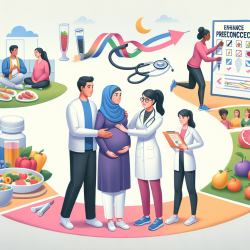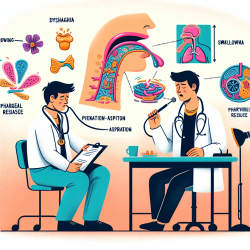Introduction
In the realm of healthcare, the preconception period is gaining recognition as a pivotal phase for intervention to prevent noncommunicable diseases (NCDs). The FIGO position paper, "Prevention of noncommunicable diseases by interventions in the preconception period," emphasizes the importance of healthcare practitioners in supporting women to achieve optimal health before conception. This blog aims to explore the key findings of the paper and provide actionable insights for practitioners to enhance their skills and contribute to better health outcomes for mothers and their offspring.
The Importance of Preconception Care
With the rising prevalence of obesity among women of reproductive age, there is an increased risk of conditions such as type 2 diabetes, gestational diabetes, and pre-eclampsia. These conditions can have detrimental effects on maternal and newborn health. The preconception period offers a unique opportunity to address weight management and nutritional status in both parents, thereby reducing the risk of NCDs and improving long-term health outcomes.
Key Recommendations for Practitioners
The FIGO position paper provides a set of recommendations for healthcare practitioners to integrate into their clinical practice. These recommendations can be adapted to local cultural and dietary practices, making them applicable in diverse settings. Here are some of the key actions practitioners can take:
- Initiate Dialogue: Engage women in discussions about their health, nutrition, and weight management before conception. This dialogue can help raise awareness and motivate women to adopt healthier lifestyles.
- Promote Healthy Nutrition: Encourage a balanced diet that meets nutritional needs and supports a healthy body mass index (BMI). Consider using tools like the FIGO Nutrition Checklist to guide dietary assessments.
- Address Social Determinants: Recognize the impact of social and environmental factors on health. Collaborate with public health initiatives to address these determinants and support systemic changes that promote health equity.
- Provide Tailored Advice: Offer personalized guidance based on individual health status, cultural preferences, and dietary habits. Tailored advice can enhance the effectiveness of interventions and improve adherence.
Encouraging Further Research
While the FIGO position paper provides a robust framework for preconception care, there is a need for ongoing research to refine and expand these guidelines. Practitioners are encouraged to contribute to research efforts by documenting outcomes, sharing best practices, and participating in collaborative studies. This collective effort can lead to more comprehensive and effective preconception care strategies.
Conclusion
By implementing the recommendations from the FIGO position paper, healthcare practitioners can play a crucial role in preventing NCDs and improving maternal and child health. The preconception period is a window of opportunity that should not be overlooked. Practitioners are urged to take proactive steps to engage women in their care and support them in achieving optimal health before conception.
To read the original research paper, please follow this link: Prevention of noncommunicable diseases by interventions in the preconception period: A FIGO position paper for action by healthcare practitioners.










